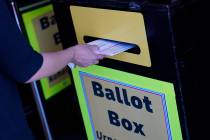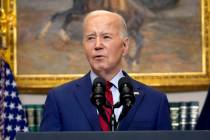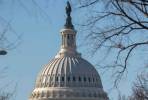Reduce spending? Oh, the humanity!
State revenues coming in lower than projected. A governor faced with a potential budget shortfall asking state agencies to draft contingency spending plans. Critics attacking the state's tax system as too dependent on too few revenue sources.
Welcome to Nevada.
Or is it California?
On Monday, California Gov. Arnold Schwarzenegger ordered state departments to draft budgets that reflect a 10 percent reduction in anticipated revenue. "Economists say the state's declining fortunes are due in large part to the shakeout in the housing market and a revenue system overly reliant on income taxes," the Los Angeles Times reported Tuesday.
The Times also noted that "Democrats already were girding for a fight over the administration's budget reduction proposals."
Well, at least Nevada Gov. Jim Gibbons can take solace in the company.
Today, Gov. Gibbons is scheduled to meet in Carson City with various state and local officials to discuss possible courses of action to address faltering sales and gaming tax revenues. Last month, the governor asked department heads to present contingency budget plans reflecting a 5 percent reduction in spending.
His request was met with shrieks of indignation from big spenders and their many media friends. Jim Rogers, chancellor of the state university system, refused to comply.
Wonder how the Governator would respond if Mr. Rogers' California counterpart threw a similar tantrum?
At any rate, all this proves instructive on a couple of levels.
First, no budget will actually be "cut" in either Nevada or California. Current discussions center around reducing the anticipated growth rate of public sector spending plans. For instance, Nevada's university system, under the direction of Mr. Rogers, will receive 9 percent more money in the current budget cycle, even if subjected to a misnamed 5 percent budget "cut."
Second, is there any state "revenue system" that will satisfy the public sector's insatiable appetite? Apparently not.
In California, a tax structure "overly reliant on income taxes" can't keep the money flowing fast enough. In Nevada, critics constantly attack a revenue stream largely reliant on gaming and sales taxes as insufficient -- despite dependable, healthy and consistent growth. No state -- even those featuring tax structures the envy of many a Nevada Democrat -- has been immune from cyclical budget downturns. We would argue that Nevada has held up better than most.
Meanwhile, we're told that states experiencing population booms -- such as Nevada -- need higher taxes to pay for growth. Yet states or cities from which residents have fled -- in the Rust Belt, for instance -- constantly need to raise revenues to make up for a "shrinking tax base."
Which is it?
In fact, the budget problems facing California, Nevada and many other states -- the budget problems caused by growth or out-migration -- have more to do with overspending than faulty tax policy. State lawmakers across the country throw money around on "needs" during the good times, creating new programs and obligations that increase base budgets. Then, when the inevitable revenue blip materializes, they cry poverty and agitate about "diversifying the tax base" so they can shake more cash out of the private sector for their next binge.
Thus starting the process all over again.























